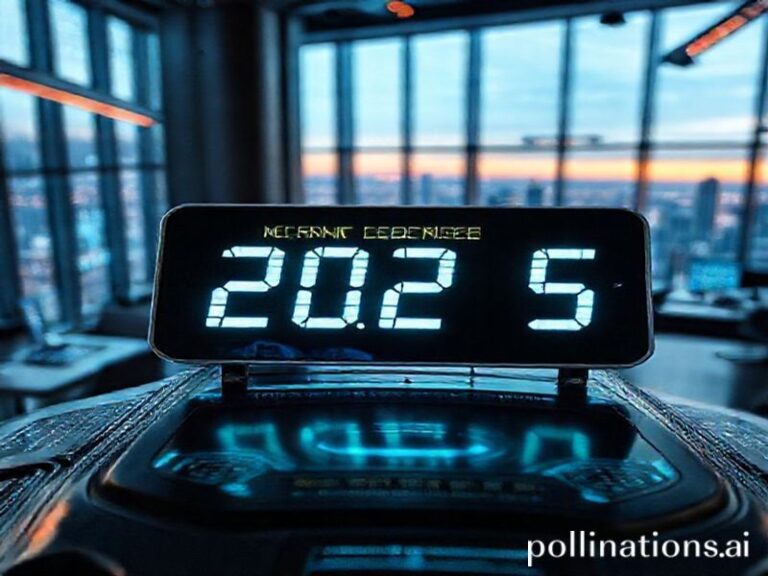The World’s Most Overqualified Shipping Clerk: Why the U.S. Transportation Secretary Holds Global Commerce Hostage
Somewhere between the tarmac of Dulles and the potholed fantasies of every commuter on Earth sits the U.S. Secretary of Transportation—a title that sounds thrillingly omnipotent until you remember it mostly involves begging Congress for money to replace bolts installed during the Ford administration. Still, for the rest of the planet, the office is less a cabinet post and more a geopolitical mood ring. When Washington sneezes—say, by grounding Boeing’s latest lawn dart—the world catches a very expensive cold in the cargo hold.
Globally, the Secretary is the accidental air-traffic controller of supply-chain anxiety. A single late-night edict to inspect certain jet engines and suddenly Frankfurt’s Christmas markets are short on fairy lights and Sri Lanka’s tea sits cooling on a dock in Long Beach. The Europeans, ever eager to lecture while quietly photocopying the FAA’s homework, call it “regulatory imperialism.” The Chinese, less diplomatically, call it Tuesday. Either way, every customs officer from Lagos to La Paz knows that when the U.S. Transportation Secretary frowns, container ships develop mysterious cases of “mechanical issues” just outside territorial waters.
Of course, in an age when microchips travel more miles than most humans ever will, the Secretary’s inbox has become the world’s weirdest concierge desk. Taiwanese semiconductor execs WhatsApp at 3 a.m. to ask if Michigan’s potholes could kindly stop swallowing their freight trucks. Congolese cobalt brokers want to know why the FAA suddenly cares about lithium-ion batteries in cargo holds—only to discover the concern was sparked by a TikTok of a flaming e-scooter in Venice Beach. Somewhere in the marble corridors, a career civil servant updates a risk matrix titled “Things That Explode, Ranked by TikTok Engagement.”
The irony is exquisite: the nation that pioneered the freeway and the frequent-flyer program now relies on a single mortal—usually a former mayor with excellent teeth and a donor Rolodex—to keep the global circulatory system from clotting. Meanwhile, every developing nation that once envied America’s interstates now watches U.S. bridges perform interpretive dance in high winds and quietly books Chinese contractors who promise to finish before the next coup. The Belt and Road Initiative isn’t just asphalt; it’s reputation management with guardrails.
Climate change, the uninvited plus-one at every infrastructure wedding, has turned the Secretary into a reluctant ringmaster. One day you’re cutting a ribbon for an electric-bus depot in Des Moines; the next you’re explaining to the Dutch why their entire tulip haul is stuck because a Category 6 hurricane has repurposed Savannah’s port as a community aquarium. The Secretary’s briefing binder now includes a color-coded map labeled “Places That Will Be Underwater Before the Midterms.” Optimists call it adaptation. Realists call it aquatic eminent domain.
Then there are the drones—mechanical mosquitoes buzzing above war zones, wedding parties, and, increasingly, LAX flight paths. Every time an Iranian proxy in the Red Sea teaches a freighter a lesson in physics, insurance premiums balloon faster than a lithium battery in July. The Secretary must therefore master the delicate art of condemning maritime piracy while quietly approving classified reroutes that turn the Cape of Good Hope into the world’s most expensive Uber surge.
Still, the job retains a certain tragic glamour. Past Secretaries have been courted by Gulf sheikhs desperate for reassurances that their sovereign wealth funds won’t be left holding stranded-airport bonds. African ministers offer mineral concessions in exchange for a single slot at Newark. The Secretary nods politely, knowing full well Congress will fund another feasibility study on maglev trains between Toledo and nowhere.
In the end, the international significance of the U.S. Secretary of Transportation boils down to this: they are the planet’s reluctant supply-chain therapist, paid in frequent-flier miles and the illusion of control. Every press conference is a séance where the living ask the dead (budgets, roads, glaciers) to kindly stay put. The rest of us fasten our seatbelts, dimly aware that turbulence isn’t just in the air—it’s in the entire system of moving stuff so we can keep pretending the world still works.







